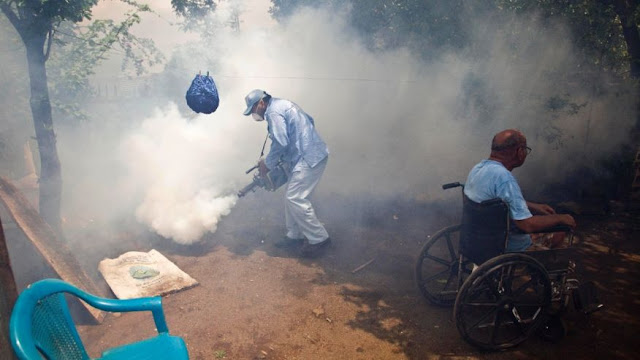Karachi
Following the spells of rain in Karachi in the last days of June, the number of dengue fever cases in the megalopolis have increased manifold and dozens of patients with dengue fever - some critically-ill - are being brought to different public and private hospitals daily. Unfortunately, however, the situation does not seem to be ringing alarm bells for the health and municipal authorities.
A survey of different public and private hospitals and interviews with the infectious diseases’ experts at different hospitals revealed that dozens of people with dengue fever, including women and children, were being brought to health facilities and given symptomatic treatment as well as mega platelets unit to save their lives, but officials were still not bothered about the situation.
No disease surveillance program has been available in Sindh for quite some time and the data of infectious diseases’ is not being collected scientifically at the Disease Early Warning System (Dews) programme of the World Health Organizstion as it was closed down in the province and despite a request by the WHO, provincial health authorities did not show any interest in taking over the programme or launching their own disease early warning system to learn about outbreaks of diseases.
The Sindh Provincial Dengue Prevention and Control Programme, which monitors the dengue situation in the province, receives daily reports of patients with viral disease from different public and private hospitals to keep an eye on the outbreak of seasonal disease, but its officials claim that despite a “marginal increase” in number of dengue patients this week in Karachi, there was no alarming situation regarding dengue in the city. “This week, we had 24 new dengue patients as compared to 27th week of the year when we had only 10 patients during the entire week. This shows a little increase in the number of dengue cases but it is not an outbreak”, Dr Masood Solangi, dengue programme manager said.
Dr Solangi claimed the situation was completely under control as hardly two to three patients were being reported at city hospitals in a day and added that all the public hospitals had been asked to reserve at least 10 beds in every hospital run either by the Sindh government or the Karachi Municipal Corporation (KMC).
According to him, at least 35 public and private hospitals, including major tertiary-care hospitals, were sharing their data of dengue patients with them on a daily basis and added that the dengue prevention and control programme officials were keeping a close eye on the vector-borne disease in the city and province.
But health experts claim that the number of dengue patients have been increased 10 to 20 times more than reported by the dengue programme officials as they only report lab-confirmed cases of dengue fever, while dozens of patients are diagnosed as dengue patients on the basis of clinical examination by the general practitioners and given symptomatic treatment at their clinics or at home.
“Only a seriously-ill patient, whose condition has deteriorated, is referred to tertiary-care hospital for admission and proper treatment; otherwise, most of the patients with dengue symptoms are treated as OPD patients”, Dr Rajesh Hirani, a postgraduate medical officer at a private hospital said. Hirani said he was seeing 10 to 15 patients with dengue like symptoms for the last five to six days and in 90 percent cases, laboratory reports confirmed that patients were suffering from dengue fever.
“There is no treatment for dengue fever except to hydrate him and give medicine to keep his temperature under control. In case of serious conditions, the patient is referred to major city hospitals and sometimes, the patient has to be given intensive care”, doctor Hirani added.
But Dr Masood Solangi was of the opinion that most of the dengue patients were only declared after lab reports confirmed that they had the viral disease and still, they were not hospitalised unless their platelets dropped below 10,000.
He reiterated that the dengue situation in Karachi and the rest of Sindh was so far under control despite the fact that the municipal authorities had not carried out fumigation in the city even after repeated requests by the health authorities to eradicate mosquitoes and their larvae before the city was expected to receive more monsoon rains.

No comments:
Post a Comment